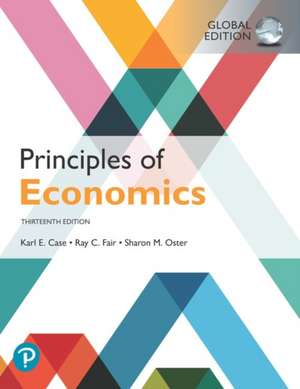Principles of Economics, Global Edition
Autor Karl Case, Ray Fair, Sharon Osteren Limba Engleză Paperback – 28 iun 2019
An introduction to the functioning of the economy and the power and breadth of economics
Reviewers tell us that Case/Fair/Oster is one of the all-time bestselling principles of economics texts because they trust it to be clear, thorough, and complete. Readers of Principles of Economics, 13th Edition come away with a basic understanding of how market economies function, an appreciation for the things they do well, and a sense of things they do poorly. With the latest research and added exercises, students begin to learn the art and science of economic thinking and start to look at some policy, and even personal decisions, in a different way.
Pearson MyLab Economics is not included. Students, if Pearson MyLab Economics is a recommended/mandatory component of the course, please ask your instructor for the correct ISBN. Pearson MyLab Economics should only be purchased when required by an instructor. Instructors, contact your Pearson representative for more information.
Reach every student by pairing this text with Pearson MyLab Economics
MyLab™ is the teaching and learning platform that empowers you to reach every student. By combining trusted author content with digital tools and a flexible platform, MyLab personalizes the learning experience and improves results for each student.
Preț: 589.69 lei
Preț vechi: 693.76 lei
-15% Nou
Puncte Express: 885
Preț estimativ în valută:
112.84€ • 118.11$ • 93.92£
112.84€ • 118.11$ • 93.92£
Carte disponibilă
Livrare economică 11-25 martie
Livrare express 22-28 februarie pentru 65.65 lei
Preluare comenzi: 021 569.72.76
Specificații
ISBN-13: 9781292294698
ISBN-10: 1292294698
Pagini: 816
Dimensiuni: 218 x 274 x 30 mm
Greutate: 1.57 kg
Ediția:13 ed
Editura: Pearson Education
ISBN-10: 1292294698
Pagini: 816
Dimensiuni: 218 x 274 x 30 mm
Greutate: 1.57 kg
Ediția:13 ed
Editura: Pearson Education
Cuprins
- PART I: INTRODUCTION TO ECONOMICS
- 1. The Scope and Method of Economics
- 2. The Economic Problem: Scarcity and Choice
- 3. Demand, Supply, and Market Equilibrium
- 4. Demand and Supply Applications
- 5. Elasticity
- PART II: THE MARKET SYSTEM
- 6. Household Behavior and Consumer Choice
- 7. The Production Process: The Behavior of Profit-Maximizing Firms
- 8. Short-Run Costs and Output Decisions
- 9. Long-Run Costs and Output Decisions
- 10. Input Demand: The Labor and Land Markets
- 11. Input Demand: The Capital Market and the Investment Decision
- 12. General Equilibrium and the Efficiency of Perfect Competition
- PART III: MARKET IMPERFECTIONS AND THE ROLE OF GOVERNMENT
- 13. Monopoly and Antitrust Policy
- 14. Oligopoly
- 15. Monopolistic Competition
- 16. Externalities, Public Goods, and Common Resources
- 17. Uncertainty and Asymmetric Information
- 18. Income Distribution and Poverty
- 19. Public Finance: The Economics of Taxation
- PART IV: CONCEPTS AND PROBLEMS IN MACROECONOMICS
- 20. Introduction to Macroeconomics
- 21. Measuring National Output and National Income
- 22. Unemployment, Inflation, and Long-Run Growth
- PART V: THE CORE OF MACROECONOMIC THEORY
- 23. Aggregate Expenditure and Equilibrium Output
- 24. The Government and Fiscal Policy
- 25. Money, the Federal Reserve, and the Interest Rate
- 26. The Determination of Aggregate Output, the Price Level, and the Interest Rate
- 27. Policy Effects and Cost Shocks in the AS/AD Model
- 28. The Labor Market in the Macroeconomy
- PART VI: FURTHER MACROECONOMICS ISSUES
- 29. Financial Crises, Stabilization, and Deficits
- 30. Household and Firm Behavior in the Macroeconomy: A Further Look
- 31. Long-Run Growth
- 32. Alternative Views in Macroeconomics
- PART VII: THE WORLD ECONOMY
- 33. International Trade, Comparative Advantage, and Protectionism
- 34. Open-Economy Macroeconomics: The Balance of Payments and Exchange Rates
- 35. Economic Growth in Developing Economies
- PART VIII: METHODOLOGY
- 36. Critical Thinking about Research
